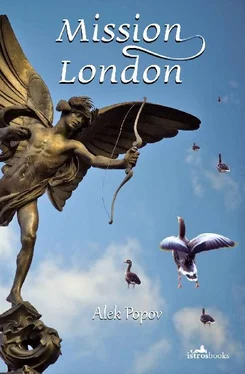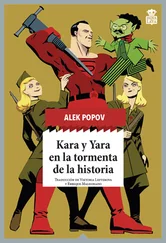His hands were tied.
All that was left for him was to hope that something might actually happen in the real world. That seemed less punishable to him, as well as far less compromising. He was prepared to take that risk, but, for that end, Katya needed to be kept around. Until then every other comfort was forbidden.
He raised his gaze from the bin and noticed the stupid face of Turkeiev, peering around the door. He had not heard him knock. “What is it?” he asked. “Come in then!” “There’s a fax for you…” started the intern, giving him the sheet. Varadin read it angrily.
Sent. 34500456
Town Council, Provadia.
Dear Mr. Ambassador,
From 24/05 to 24/06, on the invitation of the British Museum, the unique exhibition: ‘Hygiene in Bulgarian Lands’ will arrive in London; on which platform the first Water Closet in Human History will be unveiled. The latter was discovered in recent archaeological digs in the territories of the town of Provadia, and dates from 923. The authenticity of the object has been confirmed by such internationally renowned scientists as Professor Van Meis, from Holland, and Professor Charlie Reeds, from Oxford. We believe that the public recognition of this achievement of the ancient Bulgarians will greatly support the new image of our dear Homeland. The exhibition will be opened by the Mayor of Provadia, Mister Firstomaiev. We would be obliged if the Embassy could arrange accommodation for him and involve itself actively in the preparations for the event in question.
“Whaaaaaaat?! To involve ourselves with some toilet?!” Varadin raised his eyes from the fax and stared at the intern with loathing. “This falls on exactly the same day as Mrs Pezantova’s concert! Do you realise what that means?”
“Is there no way to combine the two?” the intern proposed simply. “Concert with Closet, eh?!” spat Varadin sarcastically, “Well, you can try…” “After all, such a discovery!”
“Look, I’ll tell you what,” the Ambassador cut him off brusquely. “We have priorities! And Mister Firstomaiev’s WC is not amongst them.”
“What should I tell them?”
“Nothing for the time being,” he spat. “Why are your hands in your pockets?!”
“What?” the intern threw up his hands in surprise.
“Not now!” explained the Ambassador nervously. “Before, and during the reception, I saw you wandering around with your hands in your pockets like some kind of Director. You and that other one, the Consul. That is not European behaviour!”
For fuck’s sake! the intern swore internally. His contract ran out in two months and he did not see it being extended. “But the English go around with their hands in their pockets.”
“Are you an Englishman, all of a sudden?!” shouted the Ambassador. “When you are an Englishman, then you can talk!”
The intern headed for the door without a word. Varadin stared at the fax once more. That was all he needed, that cretin from Provadia! Pezantova would have a fit. Concert and Closet. Absurd!
“Wait!” he shouted before the intern was out of the door. “Check whether it has the approval of the Ministry of Culture. And of our Ministry too!”
He had a sharp pain at the nape of his neck. It seemed to him monstrously unfair, that, whilst he was flying freely amongst the highest levels of society and creating Foreign Policy, those spiders were still trying, tirelessly and unpunished, to weave together the cobwebs of their domestic idiocies. It was impossible to be rid of them, one could only keep them at a distance, in the corners and holes where they belonged. Ah, but he was very good at that!
“88” he said grimly.
The radioman, Racho, was staring at the steeple of St George’s and chain-smoking. The metal shutters were wide open and a refreshing breeze blew in from the outside. The radioman was thinking that if they put an antenna on the steeple then their connection to Central would be vastly improved. The session had finished only ten minutes before. There had been some atmospheric interference and the transmission had taken longer than usual. The signal swung drunkenly on the oscilloscope screen, and the information flowed at the speed of glue through the eye of a needle. In spite of that, he had managed to process the material arriving from Sofia, as well as sending it to the Press Review, along with two short telegrams. He had finished for the day, unless some urgent cryptogram came through. But the likelihood of that was slim. There were still three cigarettes in the pack of Marlboro. There were another seven packs in the box on the table.
Racho left the communication’s room, leaving the door ajar and trundled down the stark white corridor, lit by neon lamps. He was a tall, flabby individual, with a face that said I don’t give a damn, behind which sheltered a crafty and calculating mind. He made a quick detour via the kitchenette, put the coffee machine on, and continued down the corridor. The other end of the Secret Sector looked onto the street. The radioman opened a window a little, stared blankly at the passing cars, and then returned, pouring himself a coffee on the way.
The Secret Sector had been constructed during the Cold War: several isolated compartments, insulated against listening devices and all sorts of unwanted intrusions. The windows were fitted with metal covers, and the outside walls were reinforced. This is where the communications hub of the Embassy, as well as the safes containing confidential information, were to be found. According to instructions, in case of enemy attack, the secret service personnel were to lock themselves in and destroy all traces of their activities. To this end, a vast metal furnace had been installed in the central compartment, for burning documents. At various points in the past the furnace had blazed merrily as it burnt tons of potentially explosive information. Now it lay dead. The only inhabitant was Racho the radioman. He burnt various bits of rubbish there, from time to time, to warm himself. Recently, the volume of operational work had dropped sharply, and Racho had very few other duties. That was why he could devote himself entirely to the fat catalogues of duty-free goods available through the Embassy, which he received regularly. Because he lived, for the most part, in the Secret Section, Racho disposed of considerable sums, which the diplomats could only dream of. Here there were no big city temptations and their consequent expenses. Life was simple and healthy, almost as cloistered as a monastery. All capitals are different, but all Secret Sections are alike.
The radioman took a gulp of hot coffee and turned to a small device that he had found in some dusty old trunk containing ‘special equipment’, which he had inherited from his predecessor. The apparatus, of Soviet manufacture, served to detect listening devices by detecting their transmissions, but hadn’t been working for some ten years or more. Racho had a weak spot for electronics, on top of which, he intended to sell the thing in a car-boot sale if he got the chance. In any case, no one took any notice of him. That morning he had plugged it into the charger, to check how reliable the battery was. The needle had showed that it was charging. That was not enough, however. He unplugged it from the charger, put on the headphones and listened. At first, the gadget made a whole heap of chaotic noises, as though cleaning itself from the many years of silence. The radioman regulated the sound-level and adjusted the antenna. Slowly, the noises cleared up, and only one signal remained, chirping like a grasshopper in the distance.
‘Well, what have we here, then?’ he exclaimed.
Memories from the days of the Cold War, filled with tension and hard work, arose in his mind. His overwhelming nostalgia, however, soon turned to worry. The sound in his headphones reminded him of an active Secret Intelligence Device. Just in case, he turned off all the equipment in the comms. room that might be generating the signal. But the signal did not fade and if anything, became clearer still. Could the Embassy be ‘bugged’?
Читать дальше












